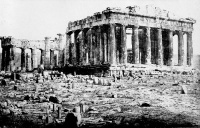Ancient Greek
From The Art and Popular Culture Encyclopedia
| Revision as of 14:37, 23 June 2010 Jahsonic (Talk | contribs) ← Previous diff |
Current revision Jahsonic (Talk | contribs) |
||
| Line 1: | Line 1: | ||
| + | [[Image:Western face of the Greek Parthenon.jpg|thumb|right|200px| | ||
| + | This page '''''{{PAGENAME}}''''' is part of the [[Ancient Greece]] series. | ||
| + | <br> | ||
| + | <small> | ||
| + | Photo: western face of the [[Parthenon]]</small>]] | ||
| {{Template}} | {{Template}} | ||
| - | :''[[Ancient Greece]]'' | ||
| - | '''Ancient Greek''' is the historical stage in the development of the [[Greek language]] spanning the [[Archaic Greece|Archaic]] (c. 9th–6th centuries BC), [[Classical Greece|Classical]] (c. 5th–4th centuries BC), and [[Hellenistic civilization|Hellenistic]] (c. 3rd century BC – 6th century AD) periods of [[ancient Greece]] and the [[classical antiquity|ancient world]]. It is predated in the 2nd millennium BC by [[Mycenaean Greek language|Mycenaean Greek]]. Its Hellenistic phase is known as [[Koine Greek|Koine]] ("common") or Biblical Greek, and its late period mutates imperceptibly into [[Medieval Greek]]. [[Koine Greek|Koine]] is regarded as a separate historical stage of its own, although in its earlier form it closely resembles Classical Greek. Prior to the Koine period, Greek of the classic and earlier periods included several regional [[Ancient Greek dialects|dialects]]. | + | '''Ancient Greek''' includes the forms of the [[Greek language]] used in [[ancient Greece]] and the [[classical antiquity|ancient world]] from around 1500 BC to 300 BC. It is often roughly divided into the following periods: [[Mycenaean Greek]] ({{c.|1400–1200 BC}}), [[Greek Dark Ages|Dark Ages]] ({{c.|1200–800 BC}}), the [[Archaic Greece|Archaic]] period ({{c.|800–500 BC}}), and the [[Classical Greece|Classical]] period ({{c.|500–300 BC}}). |
| - | The Ancient Greek language is one of the most prominent in human cultural history, as it was the language of the works of [[Homer]], of the historians, playwrights and philosophers during the [[Age of Pericles|Athenian Golden Age]], and of the [[New Testament]]. It has made a large contribution to the vocabulary of English and was a standard subject of study in Western educational institutions from the [[Renaissance]] to the early 20th century. The [[New Latin]] used in the scientific [[binomial nomenclature|binomial classification]] system continues today to draw vigorously from Ancient Greek vocabulary. | + | Ancient Greek was the language of [[Homer]] and of [[fifth-century Athens|fifth-century Athenian]] historians, playwrights, and [[Ancient Greek philosophy|philosophers]]. It has contributed many words to English vocabulary and has been a standard subject of study in educational institutions of the [[Western world]] since the [[Renaissance]]. This article primarily contains information about the [[Homeric Greek|Epic]] and [[Classical Greece|Classical]] periods of the language. |
| - | This article treats primarily the Archaic and Classical phases of the language – see also the articles on [[Mycenaean Greek language|Mycenaean Greek]] and on [[Koine Greek]]. | + | From the Hellenistic period ({{c.|300 BC}}), Ancient Greek was followed by [[Koine Greek]], which is regarded as a separate historical stage, although its earliest form closely resembles [[Attic Greek]] and its latest form approaches [[Medieval Greek]]. There were several [[Ancient Greek dialects|regional dialects]] of Ancient Greek, of which Attic Greek developed into Koine. |
| + | |||
| + | ==See also== | ||
| + | * [[Ancient Greek dialects]] | ||
| + | * [[Ancient Greek grammar]] | ||
| + | * [[Ancient Greek accent]] | ||
| + | * [[Greek alphabet]] | ||
| + | * [[Greek diacritics]] | ||
| + | * [[Greek language]] | ||
| + | * [[Hellenic languages]] | ||
| + | * [[Katharevousa]] | ||
| + | * [[Koine Greek]] | ||
| + | * [[List of Greek and Latin roots in English]] | ||
| + | * [[List of Greek phrases]] (mostly ancient Greek) | ||
| + | * [[Medieval Greek]] | ||
| + | * [[Modern Greek]] | ||
| + | * [[Mycenaean Greek]] | ||
| + | * [[Proto-Greek language]] | ||
| + | * [[Varieties of Modern Greek]] | ||
| {{GFDL}} | {{GFDL}} | ||
Current revision
|
Related e |
|
Featured: |
Ancient Greek includes the forms of the Greek language used in ancient Greece and the ancient world from around 1500 BC to 300 BC. It is often roughly divided into the following periods: Mycenaean Greek (Template:C.), Dark Ages (Template:C.), the Archaic period (Template:C.), and the Classical period (Template:C.).
Ancient Greek was the language of Homer and of fifth-century Athenian historians, playwrights, and philosophers. It has contributed many words to English vocabulary and has been a standard subject of study in educational institutions of the Western world since the Renaissance. This article primarily contains information about the Epic and Classical periods of the language.
From the Hellenistic period (Template:C.), Ancient Greek was followed by Koine Greek, which is regarded as a separate historical stage, although its earliest form closely resembles Attic Greek and its latest form approaches Medieval Greek. There were several regional dialects of Ancient Greek, of which Attic Greek developed into Koine.
See also
- Ancient Greek dialects
- Ancient Greek grammar
- Ancient Greek accent
- Greek alphabet
- Greek diacritics
- Greek language
- Hellenic languages
- Katharevousa
- Koine Greek
- List of Greek and Latin roots in English
- List of Greek phrases (mostly ancient Greek)
- Medieval Greek
- Modern Greek
- Mycenaean Greek
- Proto-Greek language
- Varieties of Modern Greek


